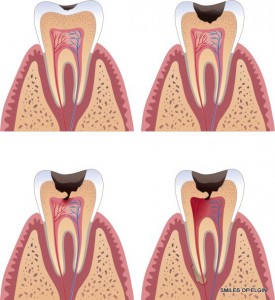1209 Dundee Avenue Elgin, IL 60120
What causes cavities?
Cavities will form when children’s teeth are exposed to sugary foods on a regular basis. Although primary teeth are eventually lost, they fulfill several important functions and should be protected. It is essential that children brush and floss twice per day at least and visit the dentist for biannual cleanings. Sometimes the pediatric dentist coats teeth with a sealant and provides fluoride supplements to further enhance the mouth’s defenses.
How will I know if my child has a cavity?
Large cavities can be excruciatingly painful, whereas tiny cavities may not be felt at all. Making matters even trickier, cavities sometimes form between the teeth, making them invisible to the naked eye. Dental X-rays and the dentist’s trained eyes help pinpoint even the tiniest of cavities so they can be treated before they worsen.

Some of the symptoms of cavities include:
- Heightened sensitivity to cool or warm foods
- Nighttime waking and crying
- Pain
- Sensitivity to spicy foods
- Toothache
If a child is experiencing any of these symptoms, it is important to visit the pediatric dentist as soon as possible.
How can I prevent cavities at home?
These are some helpful guidelines for cavity prevention:
Analyze the diet – Too many sugary or starchy snacks can expedite cavity formation.
Cut the snacks – Snacking too frequently can unnecessarily expose teeth to sugars. Make sure they consume enough water. Water will keep the teeth clean.
Lose the sippy cup – Sippy cups are thought to cause “baby bottle tooth decay” when they are used beyond the intended age (approximately twelve months).
Avoid stickiness – Sticky foods form plaque quickly, and are extremely difficult to pry off the teeth.
Rinse the pacifier – Rinse a dirty pacifier with running water as opposed to sucking on it, to avoid contaminating the baby’s mouth.
Drinks at bedtime – The milk, formula, juice, or sweetened water basically sits on the teeth all night – attacking enamel and maximizing the risk of cavities. Ensure the child has a last drink before bedtime, and then brush the teeth.
Don’t sweeten the pacifier – Parents sometimes dip pacifiers in honey to calm a cranky child. Do not be tempted to do this.
Brush and floss – Parents should brush and floss their child’s teeth twice each day until the child reaches the age of seven years old.
Check on fluoride –When used correctly, fluoride can strengthen tooth enamel and help stave off cavities
Keep to appointments – The child’s first dental visit should be scheduled around his or her first birthday, as per the American Academy of Pediatric Dentistry (AAPD) guidelines.
Office Hours
| Monday | 10:00 to 6:00 |
| Tuesday | 10:00 to 6:00 |
| Wednesday | 11:00 to 8:00 |
| Thursday | 10:00 to 6:00 |
| Friday | 10:00 to 6:00 |
| Saturday | 8:00 to 3:00 |
| Sunday | Appointment only |



Recent Comments